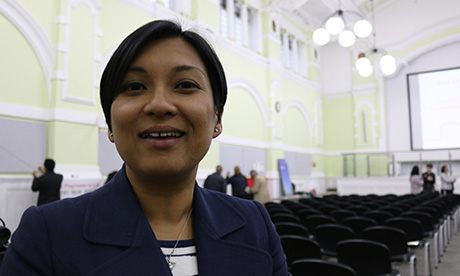Mind your tongue: teachers slam exam boards as Turkish and Polish scrapped
Axeing languages such as Turkish and Polish from GCSE and A-level syllabuses shows how language learning is being devalued in schools, a senior academic has warned.
Dr Ratha Perumal, who lives in Hackney and is a Senior Lecturer at the University of East London’s Cass School of Education, is part of a campaign to reverse plans by exam boards not to offer a range of modern foreign languages at GCSE and A-Level beyond 2017.
Hebrew, Punjabi, Polish, Persian, Dutch, Gujarati, Persian, Portuguese, Turkish, Arabic, Greek, Japanese and Urdu are all set to be scrapped by exam boards AQA, OCR and Pearson/Edexcel.
Forty-five per cent of Hackney’s secondary school pupils do not speak English as their first language, and Dr Perumal says the exam board’s decision will impact those who speak one of the axed languages at home, as they will no longer be able to develop their skills to the highest levels.
“Essentially it was a commercial decision,” Dr Perumal said. “Here were language qualifications that had very limited take up, and the numbers of students being put forward to sit those exams were falling.
“I think if the numbers coming down then the obligation on all of us is to try and raise them, because the value of languages isn’t just something of personal benefit – the country benefits too.
“Young people who engage with language competences to a high academic level do better in school, remain strongly connected to their cultural and language communities, and also have better employment prospects.”
But Hackney Learning Trust’s head Anne Canning believes community languages can thrive without accompanying exams. Speaking to the Hackney Citizen last month, she said: “As long as we support the home language through the community services, offering opportunities for that language to remain the focus of that community, I don’t think we can force the exam boards to unpick a decision that they’ve made.”
Pressure to reverse decision
But Dr Perumal believes there are moves afoot at the Department for Education to pressure the exam boards into a reversal of their decision.
Dr Perumal is among a group of academics, school teachers, policy makers and community leaders who gathered for Complementary Schools’ Week, held at the University of East London at the end of April, where they discussed how to raise awareness of languages spoken by minority communities in mainstream schools.
“A speaker for the Polish community told us they were nearing 50,000 signatures against that decision to cut Polish A-levels and GCSEs. So there’s quite a powerful lobby among ordinary citizens who feel very strongly about this,” Dr Perumal said.
Dr Perumal says supporting pupils in their mother tongues does not detract from teaching English to those from a non-English
speaking background.
“This is always something that complements [English speaking],” she said. “Research tells us that children who already speak one language confidently learn other languages more quickly.”
Simon Carrasco, former Head of Modern Foreign Languages at City Academy, said that schools will be disappointed by the exam
boards’ plans.
“Students may have arrived late from another country and [learning a community language] gives them an opportunity to excel where they otherwise wouldn’t be able to.
“Some children speak and understand another language but aren’t so good at reading or writing it. So they will make an effort to practise their reading and writing for the exam, which can allow them to get back into contact with the language they might have lost contact with over the years.”
The decision to remove the exams follows the scrapping of the Asset Languages programme in 2012. For Dr Perumal, this is part of a wider pattern of “de-emphasising languages in the curriculum”. But, when it comes to learning other subjects such as STEM, she insists, “There’s no reason why languages can’t have a complementary role to play.”

